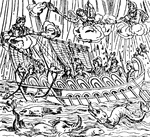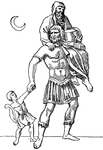Search for "aeneas"
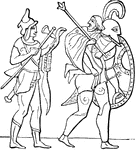
Aeneas and Ascanius
"The following cut, taken from one of Sir W. Hamilton's fictile vases, and representing Aeneas followed…

Embarking
"The following cut, taken from a very curious intaglio, represents Aeneas embarking with Anchisces and…
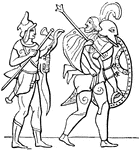
Sceptrum
"Sceptrum, which originally denoted a simple staff or walking stick, was emblematic of station and authority.…
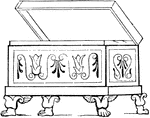
Ancient censer
"In makin Aeneas burn incense, Virgil follows the custom of his own time rather than historical verity."…
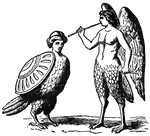
Harpies
"These were disgusting birds, with the heads of maidens, with long claws and faces pale with hunger.…
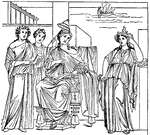
Dido parting with Aeneas
"Aeneas parted from Dido, though she tried every allurement and persuasion to detain him." —Bulfinch,…
